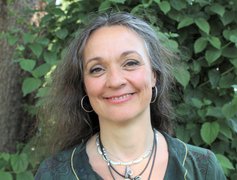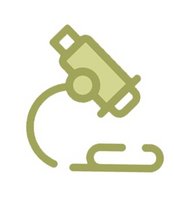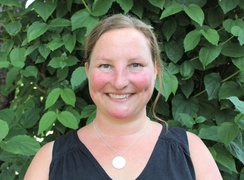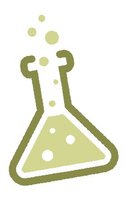MEET THE RESEARCHERS

Theresa Schilhab
Project manager, Senior doctorate and Associate professor, DPU – Aarhus Universitet
Phone number: +45 87 16 36 12
E-mail: tsc@edu.au.dk
AU Pure Research Profile
Research Gate - profile
I study
… what nature does to our way of being in the world. Does nature have a special way of affecting us because we ourselves are nature? Nature in this sense is understood as the surroundings, life processes and dynamics, in which we are designed to function within, like any other organism.
The influence is manifold
I therefore look at experiences of nature, learning and education in Natural Technology. The project focuses especially on smart technology as an incentive for more nature experiences, more education and a special kind of formation.
With our increasing use of the internet
… and the general organization of our society, children are less in direct contact with nature and outdoor-surroundings. Experiences with the physical world are no longer a given, as experiences in the digital world take over.
We want to shed some light
... on how smart technology can help attract more children into the nature. We also want to contribute to an understanding of how smart technology and nature can cooperate. What happens to the experience of nature, education and formation when technology is actively included in nature?
Attention
... is the common denominator in this research that deals with nature's influence on our cognition and thinking. Therefore, I focus particularly on children's attention processes and their experience of being present, for instance through mobile eye trackers. We are faced with numerous conceptual issues about what nature is, what experiences of nature, learning and formation are, and how nature affects us. That is why I also work with theoretical philosophy when it is required.


Gertrud Lynge Esbensen
Anthropologist, Ph.D., DPU - Aarhus University
Phone number: +45 51 44 57 30
E-mail: gle@edu.au.dk
AU Pure Research Profile
Research Gate - Profile
I study
… the social relations we have and the cultural practices we are part of. I am particularly occupied by the informal learning that we gain through participating in communities, as when children and adolescents together explore and wonder in and about nature.
Another matter that occupies me
... is the understanding of technology and what technology “does” to our everyday lives and to our volume of possibilities. Because technology changes our lives in many ways, both directly and indirectly. So how does it affect the experiences in nature of children and adolescents?
Smart technology
… radically changes the opportunities we have, when we are out. We can take pictures, movies, navigate, take notes, look things up, play games or post on social media. This naturally diverts our attention away from what we are doing in the now, but it can also be used to further immersion, gain experience and to secure ourselves in new ways.
Therefore, we wish to investigate
… whether the different circumstances can be used to mobilise more children and adolescents to experience and interact with nature. Here it is ideal to look at the purposes of different technologies according to how they are used in practice.
Participant
Observation
... is a suitable way to explore this – which means going out and participating in technological nature activities across the country – to see what people do with technology, what works, where and why - and to talk to both planners and participants about their activities and perspectives.

Some of the questions we look forward to exploring are:
-
Increased use of technology can hinder children's experiences of nature, but does it have to?
-
Can technology help support children and adolescents’ involvement in nature instead?
-
How does smart technology change experiences of nature?
-
What are the potentials and limitations of using smart technology in nature? - Can it be more than merely disturbing and stressful? - Can it also provide new opportunities?
-
How does smart technology interact with our perception of nature and experiences of nature?
-
What gives children and adolescents joy in nature?
-
Why is it important for children and adolescents to go into nature? - What kind of experiences do we place value in them receiving?